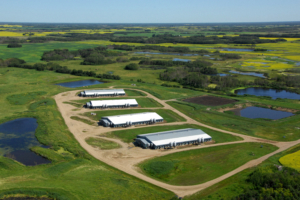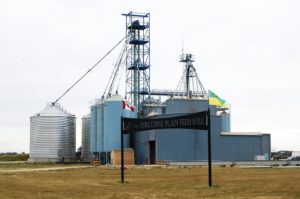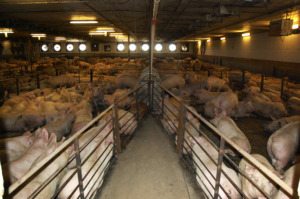Quebec-based Olymel is recruiting farmers to build new barns to finish the pigs its own farms are raising in Western Canada.
In an interview with Prairie Hog Country late in May, Casey Smit, vice-president of swine production for Olymel in Western Canada, said the company needs 100,000 more spaces to finish the pigs being raised from a sow herd that now totals just over 51,000 animals in Alberta and Saskatchewan.
“As part of our integrated model, we have our own nucleus herd, we have our own multiplication, we have all of our own breeding animals, etc.,” said Smit.
“So, as a result of all of that, we produce more pigs today than we can actually finish in Western Canada.”
Any existing barns suitable for Olymel’s purposes have already been locked up, including 125,000 finishing spaces already on contract at various farms in Alberta, says Smit.
“We have operations in Alberta that we were able to contract because they were empty or they were looking for somebody to put hogs in those barns – we took all those spaces up over the last four to five years.”
Olymel pigs that cannot be finished locally are shipped to the US as isoweans.
Olymel has therefore set up a new-barn contracting program to attract producers who are willing to get back into hogs or expand their facilities so it can finish more pigs locally and beef up the supply to its Red Deer plant.
The company had previously announced a goal of ramping the plant up to full capacity by 2020. However, the supply of finished hogs available to the company, both from its own farms and from other producers, is still well short of the plant capacity of 1.5 million pigs per year, says Smit.
“The plant needs to be healthy in terms of supply. “There’s nothing worse than a plant that is not very efficient, that can’t run at capacity. From Olymel’s perspective, that is how they manage the plant, is by through-put. Ideally, they would like to utilize it at capacity.”
 The challenge in Western Canada in recent years is that there had been minimal expansion in hog finishing, says Smit.
The challenge in Western Canada in recent years is that there had been minimal expansion in hog finishing, says Smit.
“There’ve been a lot of isowean sales to the US, but not enough on the finishing side, and there are a number of reasons for that.” Vertical integration at Olymel started in 2013 with the purchase of Humboldt, Sask-based Big Sky Farms, Canada’s third largest hog production company at that time with 41,000 sows in total. The company was renamed OlySky in recognition of its origins.
“What was key for Olymel was that we had an infrastructure here,” says Smit, who was Big Sky’s CEO at the time and continues to work out of OlySky’s head office in Humboldt.
Olymel has acquired additional sow herds since the Big Sky purchase, including buying the 5,000-sow Peace Pork farm in Northern Alberta and striking an agreement with Pinnacle Farms at Strathmore, which has 6,000 head. Olymel owns the inventory and has an option to purchase the facilities, says Smit.
Olymel’s new-barn program offers a higher base rate than its existing contracts and runs for a 10-year term, giving farmers a long-term agreement that they can take to the bank for financing.
Smit believes the new-barn program will be most attractive to younger farmers and Hutterite colonies who have diversified operations that can benefit from having a finishing barn on the site, including using manure to fertilize crops.
Farmers would be required to build or renovate to Olymel’s standard, and then feed the animals to the company’s specifications. Olymel will supply feed, take care of all shipping and provide expertise. Farmers would receive a monthly cheque, with potential for bonuses based on their adherence to the program and on the amount of pork they produce per square foot.
Smit says new barns will need to be of sufficient capacity to meet the “critical mass” necessary for efficient production, including shipping enough  pigs at one time to fill a truck.
pigs at one time to fill a truck.
Pigs will not have to be weighed because Olymel has already crunched the numbers and set up a feeding program that meets its goals, says Smit.
The company will take random animals from the pens at Week 14 to see how they measure up, and then set a shipping date from those data.
Smit believes the program reduces a great deal of risk for farmers, assuming they have the stockmanship to manage the animals well, maintain their barns and ensure their pigs and people are safe and healthy.
“Our goal is to get pigs finished in Western Canada, to find producers that want to participate in our program. We own the pigs all the way through the value chain and we want to partner with producers that want to participate in that and provide them the respectable return on their investment,” says Smit. Olymel’s farms in Alberta will continue to pay their levies to Alberta Pork, which became optional a number of years ago, says Smit.
“We believe the industry needs to be strong. We want our producers to be strong. We’re fully supportive of Alberta Pork, of Saskatchewan Pork and Manitoba Pork, for what they do for all of the producers in the provinces, not just the vertical integrators.”
Smit says he has discussed Olymel’s plans with Darcy Fitzgerald of Alberta Pork and with Neil Ketilson of Saskatchewan Pork to ensure that they’re fully aware of the program.
Smit says Olymel is not the only vertically-integrated company seeking more finishing capacity. He cites results of an informal survey by Ben Woolley, vice-president of Sunterra, who determined that Western Canada is short by about one million feeder spaces.
“(The new-barn program) is our effort to get something going and we’re more than happy to have a discussion with anyone on it,” he said. •
— By Brenda Kossowan




